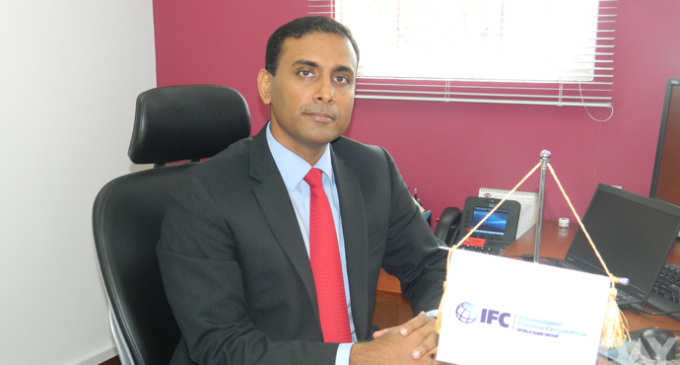Economic development needs an enlarged private sector: Vikram Kumar

TODAY has interviewed Mr Vikram Kumar, International finance corporation (IFC) Resident Representative, on their views as eegards private sector development and investment, as follows.
Education and Work experience
I graduated with a Bachelor’s Degree in Civil Engineering from the Indian Institute of Technology and a Master’s Degree in Management with speciali-zation in Operations and Finance from the Indian Institute of Management.
I moved to IFC’s Myanmar office in December 2013. Prior to this assignment, I was Special Advisor to the Vice President, Asia Pacific in Washington DC for 2 years, supporting strategy development and implemen-tation for IFC’s Asia Pacific Operations. Previously, I spent 3 years in Nairobi developing and financing infrastructure projects, particularly in power and transportation sectors in Eastern and Southern Africa region and over 2 years in New Delhi working on infrastructure projects in the water and trans-portation sectors in India and Nepal. Prior to joining IFC, I also worked in various roles spanning Corporate Investment Banking and Credit Risk Management functions in premier institutions like ICICI Bank, Bank of America and YES Bank.
IFC Projects underway in Myanmar
IFC’s investment and advisory program in Myanmar is growing at a significant pace given the tremendous needs of the economy, especially in critical areas like infrastructure, agribusiness and financial sectors and also the reform process around facilitating private sector investments.
Activities relating to createjob opportunities
IFC supports the private sector development to create jobs to achieve sustainable economic development in Myanmar. IFC makes invest-ments to create job opportunities and help expansion of business in sectors such as hotel and tourism, manufacturing, agribusiness and financial services. We also provide Advisory Services to the Government of Myanmar to improve investment climate for the private sector in order to create job opportunities for people of Myanmar. In collaboration with the Government of Myanmar and UMFCCI, we are helping to organize the Myanmar Business Forum through which the private sector can share the difficulties they are facing in doing business with the Government. The Government can then act on these to improve the business environment for the private sector.
Improving Access to Finance for Private sector
Access to Finance is the most critical constraint facing private sector business in Myanmar. Banks are reluctant to provide loans to busi-nesses without collateral. We are providing Technical Assistance to the Central Bank of Myanmar to establish credit reporting system in Myanmar. A credit bureau will record credit history of the borrowers and share the infor-mation among the credit providers participating in the Credit Reporting System. In this regard, the borrowers will have easier access to loan from lending institutions based on their credit worthiness. This system will allow banks and financing institutions to review the credit histories of the borrowers. It will prevent over indebtedness of the borrowers. We will also provide Technical Assistance to the Central Bank of Myanmar for Secured Transactions Reform Project which will provide SMEs better access to finance against the movable assets, e.g., account receivables, inventories and intan-gible assets.
View on Microfinance Sector in Myanmar
People need to differentiate between Microfi-nance and Informal Lending Business. Micro-finance Institutions (MFIs) make loans without collateral to the poor. It charges 2.5 percent interest per month and thus interest rate cap for MFIs is 30 percent per annum according to the regulations set by the Government of Myanmar. We provide loans to MFIs which are following international best practices and standards of responsible finance. On the other hand, the informal money lending businesses charge much higher interest rates such as 10% per month, which is basically taking advantage of the poor.
IFC’s investment programs in Myanmar
IFC is looking to invest USD 1 billion in Myan-mar over the next 2-3 years. In terms of propor-tion, 70 percent of total investment is expected to be for infrastructure development in energy and transportation; 20 percent for agriculture, manufacturing, hotel, tourism and retail and 10 percent on financial services sector. In other words, IFC will invest about USD 600 million in infrastructure development; USD 200 million in hotels and tourism, retail and manufacturing; and about USD 100 million in banking and microfinance sector. IFC typically takes 25 percent exposure in projects, and therefore IFC’s investment of USD 1 billion in Myanmar in next 2-3 years implies that total projects supported by IFC could be as high as USD 4 billion which represents a significant amount of investment in Myanmar.
Post-2015 Foreign Investment prospects
Myanmar is going in the right direction. We believe that the Government is reform oriented. When you look at the tendering of the mobile operator license, granting of the foreign banking licenses, I give full credit to the Government for achieving this level of transparency. We would not make a significant financial commit-ment if we were not confidentabout Myanmar’s attractivenessas a target for foreign direct investment. We think that the direction of eco-nomic reform and the market opportunity in Myanmar are good enough to attract quality foreign investors.
Foreign investors will enter Myanmar not just to be in SEZs, but also for other areas in Myanmar. Of course, SEZs are attractive due to tax exemption, but there are other factors that drives investment such as proximity to the market, supporting infrastructure, cost of labor without whichindustry will not be competitive in the regional or international market. We are also supporting improvement in the investment climate through the work on the new Investment law, Doing Business and Trade related reform. This will help ensure that the other areas of Myanmarare not left out in the development process.
How Myanmar is different
Working in Myanmar has been a unique experience for me. This country needs support in almost all the sectors, especially in the development of the private sector which means IFC has a big role to play in Myanmar. We have been working with very trust worthy clients in Myanmar so far and we expect to maintain this trend in the future. The biggest challenge in Myanmar is capacity. There are not enough people with right skills to hire in Myanmar when a new industry/institution comes in. It is unique to Myanmar, as the country has been shut down for many years and skill develop-menthas not kept pace with other parts of the world. Banking is the engine of the economy. When Banks and MFIs do not function properly, the rest of the economy struggles. Financial auditing also needs to be improvedfor firms to have access to financing and investment from international institutions. In Myanmar, some companies pay full taxes but most do not pay the correct level of taxes. However, these issues can’t be solved overnight and will change over time.Corporate Governance also needs to be improved and this will also help make the opening of the stock exchange a success.
./wp-content/uploads/2018/10/Emirate-Online-TDY.png)
















There are no comments at the moment, do you want to add one?
Write a comment